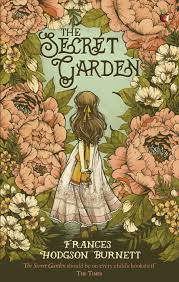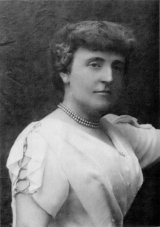The Secret Garden Page #22
The Secret Garden is a novel by Frances Hodgson Burnett first published in book form in 1911, after serialization in The American Magazine. Set in England, it is one of Burnett's most popular novels and seen as a classic of English children's literature. Several stage and film adaptations have been made.
Dickon nodded. “Martha told me there was one as no one ever went inside,” he answered. “Us used to wonder what it was like.” He stopped and looked round at the lovely gray tangle about him, and his round eyes looked queerly happy. “Eh! the nests as’ll be here come springtime,” he said. “It’d be th’ safest nestin’ place in England. No one never comin’ near an’ tangles o’ trees an’ roses to build in. I wonder all th’ birds on th’ moor don’t build here.” Mistress Mary put her hand on his arm again without knowing it. “Will there be roses?” she whispered. “Can you tell? I thought perhaps they were all dead.” “Eh! No! Not them—not all of ’em!” he answered. “Look here!” He stepped over to the nearest tree—an old, old one with gray lichen all over its bark, but upholding a curtain of tangled sprays and branches. He took a thick knife out of his pocket and opened one of its blades. “There’s lots o’ dead wood as ought to be cut out,” he said. “An’ there’s a lot o’ old wood, but it made some new last year. This here’s a new bit,” and he touched a shoot which looked brownish green instead of hard, dry gray. Mary touched it herself in an eager, reverent way. “That one?” she said. “Is that one quite alive quite?” Dickon curved his wide smiling mouth. “It’s as wick as you or me,” he said; and Mary remembered that Martha had told her that “wick” meant “alive” or “lively.” “I’m glad it’s wick!” she cried out in her whisper. “I want them all to be wick. Let us go round the garden and count how many wick ones there are.” She quite panted with eagerness, and Dickon was as eager as she was. They went from tree to tree and from bush to bush. Dickon carried his knife in his hand and showed her things which she thought wonderful. “They’ve run wild,” he said, “but th’ strongest ones has fair thrived on it. The delicatest ones has died out, but th’ others has growed an’ growed, an’ spread an’ spread, till they’s a wonder. See here!” and he pulled down a thick gray, dry-looking branch. “A body might think this was dead wood, but I don’t believe it is—down to th’ root. I’ll cut it low down an’ see.” He knelt and with his knife cut the lifeless-looking branch through, not far above the earth. “There!” he said exultantly. “I told thee so. There’s green in that wood yet. Look at it.” Mary was down on her knees before he spoke, gazing with all her might. “When it looks a bit greenish an’ juicy like that, it’s wick,” he explained. “When th’ inside is dry an’ breaks easy, like this here piece I’ve cut off, it’s done for. There’s a big root here as all this live wood sprung out of, an’ if th’ old wood’s cut off an’ it’s dug round, and took care of there’ll be—” he stopped and lifted his face to look up at the climbing and hanging sprays above him—“there’ll be a fountain o’ roses here this summer.” They went from bush to bush and from tree to tree. He was very strong and clever with his knife and knew how to cut the dry and dead wood away, and could tell when an unpromising bough or twig had still green life in it. In the course of half an hour Mary thought she could tell too, and when he cut through a lifeless-looking branch she would cry out joyfully under her breath when she caught sight of the least shade of moist green. The spade, and hoe, and fork were very useful. He showed her how to use the fork while he dug about roots with the spade and stirred the earth and let the air in. They were working industriously round one of the biggest standard roses when he caught sight of something which made him utter an exclamation of surprise. “Why!” he cried, pointing to the grass a few feet away. “Who did that there?” It was one of Mary’s own little clearings round the pale green points. “I did it,” said Mary. “Why, I thought tha’ didn’t know nothin’ about gardenin’,” he exclaimed. “I don’t,” she answered, “but they were so little, and the grass was so thick and strong, and they looked as if they had no room to breathe. So I made a place for them. I don’t even know what they are.” Dickon went and knelt down by them, smiling his wide smile. “Tha’ was right,” he said. “A gardener couldn’t have told thee better. They’ll grow now like Jack’s bean-stalk. They’re crocuses an’ snowdrops, an’ these here is narcissuses,” turning to another patch, “an here’s daffydowndillys. Eh! they will be a sight.” He ran from one clearing to another. “Tha’ has done a lot o’ work for such a little wench,” he said, looking her over. “I’m growing fatter,” said Mary, “and I’m growing stronger. I used always to be tired. When I dig I’m not tired at all. I like to smell the earth when it’s turned up.” “It’s rare good for thee,” he said, nodding his head wisely. “There’s naught as nice as th’ smell o’ good clean earth, except th’ smell o’ fresh growin’ things when th’ rain falls on ’em. I get out on th’ moor many a day when it’s rainin’ an’ I lie under a bush an’ listen to th’ soft swish o’ drops on th’ heather an’ I just sniff an’ sniff. My nose end fair quivers like a rabbit’s, mother says.” “Do you never catch cold?” inquired Mary, gazing at him wonderingly. She had never seen such a funny boy, or such a nice one. “Not me,” he said, grinning. “I never ketched cold since I was born. I wasn’t brought up nesh enough. I’ve chased about th’ moor in all weathers same as th’ rabbits does. Mother says I’ve sniffed up too much fresh air for twelve year’ to ever get to sniffin’ with cold. I’m as tough as a white-thorn knobstick.” He was working all the time he was talking and Mary was following him and helping him with her fork or the trowel. “There’s a lot of work to do here!” he said once, looking about quite exultantly. “Will you come again and help me to do it?” Mary begged. “I’m sure I can help, too. I can dig and pull up weeds, and do whatever you tell me. Oh! do come, Dickon!” “I’ll come every day if tha’ wants me, rain or shine,” he answered stoutly. “It’s the best fun I ever had in my life—shut in here an’ wakenin’ up a garden.” “If you will come,” said Mary, “if you will help me to make it alive I’ll—I don’t know what I’ll do,” she ended helplessly. What could you do for a boy like that? “I’ll tell thee what tha’ll do,” said Dickon, with his happy grin. “Tha’ll get fat an’ tha’ll get as hungry as a young fox an’ tha’ll learn how to talk to th’ robin same as I do. Eh! we’ll have a lot o’ fun.” He began to walk about, looking up in the trees and at the walls and bushes with a thoughtful expression. “I wouldn’t want to make it look like a gardener’s garden, all clipped an’ spick an’ span, would you?” he said. “It’s nicer like this with things runnin’ wild, an’ swingin’ an’ catchin’ hold of each other.” “Don’t let us make it tidy,” said Mary anxiously. “It wouldn’t seem like a secret garden if it was tidy.” Dickon stood rubbing his rusty-red head with a rather puzzled look. “It’s a secret garden sure enough,” he said, “but seems like someone besides th’ robin must have been in it since it was shut up ten year’ ago.”
Translation
Translate and read this book in other languages:
Select another language:
- - Select -
- 简体中文 (Chinese - Simplified)
- 繁體中文 (Chinese - Traditional)
- Español (Spanish)
- Esperanto (Esperanto)
- 日本語 (Japanese)
- Português (Portuguese)
- Deutsch (German)
- العربية (Arabic)
- Français (French)
- Русский (Russian)
- ಕನ್ನಡ (Kannada)
- 한국어 (Korean)
- עברית (Hebrew)
- Gaeilge (Irish)
- Українська (Ukrainian)
- اردو (Urdu)
- Magyar (Hungarian)
- मानक हिन्दी (Hindi)
- Indonesia (Indonesian)
- Italiano (Italian)
- தமிழ் (Tamil)
- Türkçe (Turkish)
- తెలుగు (Telugu)
- ภาษาไทย (Thai)
- Tiếng Việt (Vietnamese)
- Čeština (Czech)
- Polski (Polish)
- Bahasa Indonesia (Indonesian)
- Românește (Romanian)
- Nederlands (Dutch)
- Ελληνικά (Greek)
- Latinum (Latin)
- Svenska (Swedish)
- Dansk (Danish)
- Suomi (Finnish)
- فارسی (Persian)
- ייִדיש (Yiddish)
- հայերեն (Armenian)
- Norsk (Norwegian)
- English (English)
Citation
Use the citation below to add this book to your bibliography:
Style:MLAChicagoAPA
"The Secret Garden Books." Literature.com. STANDS4 LLC, 2024. Web. 26 Nov. 2024. <https://www.literature.com/book/the_secret_garden_427>.




Discuss this The Secret Garden book with the community:
Report Comment
We're doing our best to make sure our content is useful, accurate and safe.
If by any chance you spot an inappropriate comment while navigating through our website please use this form to let us know, and we'll take care of it shortly.
Attachment
You need to be logged in to favorite.
Log In